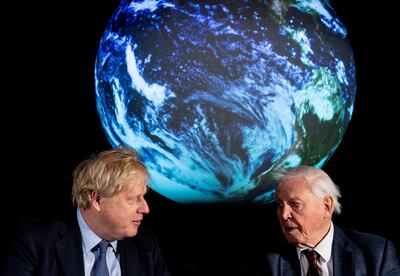By its very nature, Cop26, the global climate summit that begins today, is an event focused on the future. But when British Prime Minister Boris Johnson delivered a speech to world leaders on Friday in the run-up to the meeting, he built his case on lessons from the past, warning that "when things start to go wrong, they can go wrong at extraordinary speed. You saw that with the decline and fall of the Roman empire".
The course of history in the Middle East, with its close ties to the Mediterranean and Europe, was shaped by this destructive episode. Tragically, almost two thousand years later, the world faces the prospect of another such catastrophe; Mr Johnson warned it will be one of "huge movements of populations, huge migrations, shortages of food and water and conflict”.
Once again, the Middle East would be on the frontline. It is already the most water-stressed region on Earth and temperatures are rising twice as fast as the rest of the world.
The story of Cop26 so far suggests that the international community is not ready to agree on solutions to halt this trend. Geopolitical tension between the West and China threatened to see the latter boycott the meeting altogether. Fortunately this has not happened, and Chinese President Xi Jinping, while not attending in person, will address the meeting via video link.

A more enduring challenge is that almost no countries are on track to meet responsibilities under the Paris Climate Accords. Only The Gambia is on course, according to Climate Action Tracker, an independent scientific analysis body.
All this is a cause for concern. But there have been recent developments to give people in the Middle East hope. Major regional powers have announced ambitious plans to reach net zero emissions: the UAE aims to do so by 2050 and Saudi Arabia by 2060.
That two countries whose modern development has been so closely tied to hydrocarbons are committing to these ambitious targets is not just an example to the region, but to the world.
And while the ultimate solution to the danger we face lies in huge national responsibilities to decarbonise, adaptation and new technologies will play a crucial role in saving lives and livelihoods as the world waits for fundamental global change.
In this regard, the Middle East is one region paving the way. The UAE, for example, has recently elaborated on how it plans to develop a healthcare system better adapted to dealing with a changing climate. This includes work to advance treatment for heat stress, as well as a review of the emissions for which the healthcare system is responsible. It is also working on a joint plan with the US, the Agriculture Innovation Mission, to boost resilience and reduce carbon emissions in the food production sector.
What comes out of Cop26 in the next few days and weeks will show us just how committed countries are to making the sacrifices we need to stabilise the future. Faced with a particularly immediate threat, it might be the Middle East that leads the charge.

